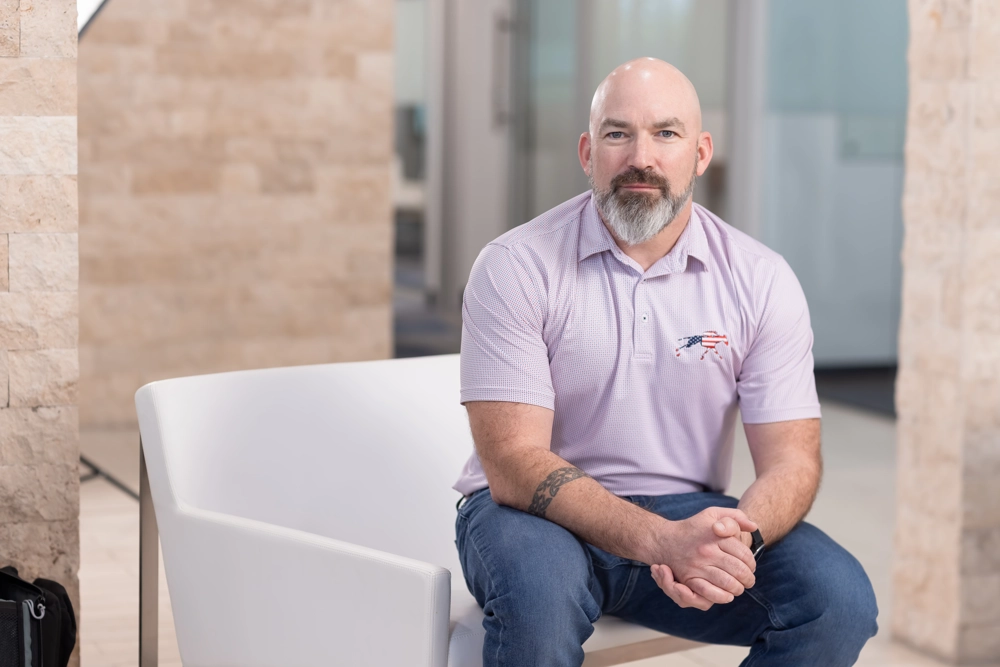Brian Davis: A Veteran & Project Manager Living by the Ranger Creed
As an Army Ranger, Phoenix Project Manager Brian Davis learned and sharpened crisis management, precision and discipline – skills that he applies in his construction role.

His grandfather served in the Navy during WWII. His father served in the Marine Corps during the Vietnam War. Both instilled a passionate patriotism in Brian Davis that led him to join ROTC in high school and enlist with the Army after graduating at just 17 years old.
“I've always been very patriotic, and I wanted to serve our country as my grandfather and father did," he said. “I was particularly interested the military's special operations forces, but I was also a pretty small, scrawny kid, and, truthfully, there were a lot of people who doubted my ability to achieve the high standards special ops required. That really drove me."
With grit and determination, Brian achieved his goal of serving in the 75th Ranger Regiment, and he spent his entire military career serving in every Ranger combat position, including rifleman, radio communications specialist, fire team leader, weapons squad leader and Ranger instructor, and performing jumpmaster and fast rope master duties.
The 75th Ranger Regiment is an elite and highly selective Special Operations Force and among the most mentally and physically demanding units in the U.S. Military. Rangers are adeptly skilled in crisis management, precision and discipline; and undergo constant readiness exercises that prepare them to complete often lethal missions, including airfield seizures, air assaults, direct action, hostage rescues and counter terrorism.
“I was a Ranger instructor in September of 2001 and already had orders to return to an operational Ranger battalion when the Twin Towers were struck," he recalled. “I was deployed to Afghanistan in April of 2002 and Iraq in March of 2003. As you might imagine, I can't talk about my specific missions, but it's fair to say you probably heard about some of them on the news."
Indeed, Brian and his fellow Rangers played a critical and heroic role in Operations Enduring Freedom and Iraqi Freedom during the last two years of his military service.
“I was selected for promotion in August of 2003, but a promotion at that stage of my career meant leaving the Rangers, leaving my 'brotherhood' and leaving the adrenaline rush and the extreme nature of the work I loved. I had achieved all the goals I had set for my military career so felt it was a good time to return to civilian life and set new goals."
A Chance at a New Career
Being a Ranger requires an exceptionally high level of physical, mental and emotional rigor, and Rangers must successfully complete the Ranger Assessment and Selection Program (RASP), an intense eight-week course that tests a soldier's physical and mental strength under extreme conditions, and Ranger School, the Army's premier leadership program. According to the Army's website, just 35% of Ranger candidates graduate from RASP.
Noted Brian, “RASP and Ranger School not only prepare you for the grueling challenges of combat, but they also prepare you to lead under the worst possible conditions, like sleep deprivation, hunger and extreme fatigue. You train to absolute mental and physical exhaustion from the Appalachian mountains to the Florida swamps."
For Brian, the intense training prepared him well for his more than eight-year career as a Ranger, and he credits it with instilling in him the resilience, determination and patience that saw him through what he says was a difficult transition to civilian life.
After leaving the military, Brian moved to Germany with his wife, attended college full time and earned a Bachelor of Science in Business Administration. But he always missed the exhilaration of being a Ranger. Brian was unsure of what he wanted to do professionally, so he worked in financial management before moving on to support a number of State Department security contracts. It would take him several years to discover what he'd been longing for and what, he believes, the military prepared him for.
“About five years ago, I realized that I enjoy building things almost as much as I enjoyed blowing them up!" he exclaimed. That personal realization led Brian to pursue a new career in construction project management. While overseeing projects for a defense manufacturer, Brian quickly realized that there's a dynamic nature to construction management that is not too unlike the military. “I'm constantly challenged, pressured and required to pivot, reassess and recover all while maintaining my composure."
Three years later, in 2022, Brian joined Opus as a Project Manager when Richard Chazal, Director of Project Management in the Phoenix office, took a chance on him.
“Brian didn't have a long track record in construction, but he was able to talk about management, leadership and teamwork with more authority than anyone I'd ever met," said Richard. “You can teach someone the technical skills needed to manage major construction projects, but you can't teach the softer skills. Brian's presence, the way he carried himself, it gave me every confidence that if I hired him, he wouldn't let me down. I have no doubt the military played an important role in shaping his attitude and aptitude."
The Ranger Creed
As a Ranger, Brian learned and lived by the Ranger Creed, which conveys the principles by which Army Rangers conduct themselves. Among its core tenets are morality, respect, excellence and a thirst for both knowledge and mission success. As a civilian, the creed remains the guidepost by which Brian lives and leads.
“I often reflect on the creed to see where I might be falling short in my daily life," he said. “Am I delivering excellence in all I do? Am I doing right by my clients? Am I driving success? Am I giving more than 100%? I'll always be a Ranger, and I'll always look to the creed as a reminder of what I stand for and who I aspire to be."
For his part, Richard's not sure what else Brian could aspire to. “As a Director, I strive to develop employees who are confident while remaining humble and curious. That's Brian, and it has nothing to do with me. It's how he's been since his very first day. I've learned a lot about the Rangers and the Ranger Creed in the last three years, and a lot about leadership—all from working alongside Brian."
In addition to the Ranger Creed, is the Ranger Motto, “Lead the Way." The motto was born from Ranger efforts on the beaches of Normandy during World War II, when elements of the Rangers were ordered to “lead the way" off Omaha Beach during the D-Day invasion.
“It was a little easier to live by the Ranger Motto when I was an active Ranger," mused Brian. “Ranger infiltration techniques often required us to quickly arrive at a target location by parachuting out of a plane or fast-roping from a helicopter. My work at Opus is incredibly rewarding and fulfilling, but there's not much opportunity to fast-rope!"
Despite leaving the thrill of high-risk modes of transportation behind, there is no question that Brian leads in all aspects of his life.
***
We're recognizing Military Appreciation Month and want to thank all the current and former service members at Opus and beyond.
***
Our associates are talented, dedicated and knowledgeable. They streamline complex projects and always deliver value to clients. Read more profiles of our team.
Article Type: Blog Post
Topics: Associate Profile | Phoenix


